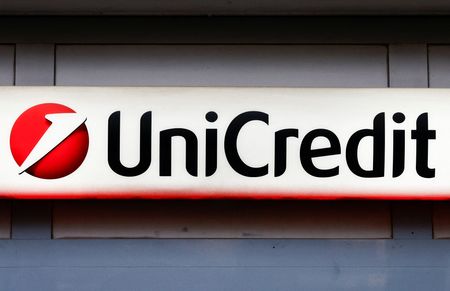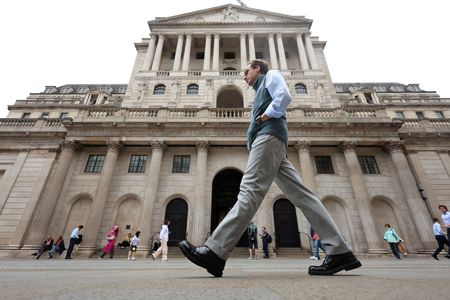(Reuters) -Strong results from AstraZeneca helped London’s blue-chip index notch a record close on Thursday, while a dovish majority behind the Bank of England’s move to deliver a 25-basis-point interest rate cut fuelled bets of more to come.
The exporter heavy FTSE 100 also got a boost from a weaker pound, closing 1.2% higher. The domestically focussed mid-cap FTSE 250 gained 1%.
The BoE cut rates to 4.5% as expected but two policymakers sought a bigger reduction.
Traders are now expecting 63 basis points in rate reductions by the end of the year from around 60 bps before the meeting.
“The tone in the minutes signals a clear easing bias for all MPC (Monetary Policy Committee) members and leaves the door open for further interest rate cuts this year,” said KPMG chief economist Yael Selfin said.
“Nonetheless, domestic uncertainty remains with the upcoming tax rises and the increase in the National Living Wage.”
Reaction in the pound and UK government bond market was more sombre.
Sterling slumped and UK gilt yields slipped as the BoE halved its 2025 growth outlook – a blow for finance minister Rachel Reeves who is seeking to speed up the economy.
“The difference between the FTSE 100 and the UK economy have been starkly laid bare today,” said Chris Beauchamp, chief market analyst at trading platform IG.
“Any relief among individual Britons regarding lower rates is likely to be tempered by the warnings about weaker growth and higher inflation.”
AstraZeneca shares jumped 6.6% to log their best day in more than 4 years as the drugmaker’s update on a likely fine in China reassured investors the business impact would be minimal, while it reported fourth-quarter earnings slightly above analysts’ estimates.
Anglo American was also among the top FTSE 100 gainers.
Most major subsectors were in the green pharma and biotech index jumping 3.7% and industrial metal miners rising 3%, helped by 5% gain in Anglo American after its fourth-quarter production report.
Highlighting the economic challenges, British construction firm activity dropped in January with housebuilding contracting at its fastest rate in a year.
Elsewhere, a survey showed British households’ expectations for inflation fell in January, with one-year expectations falling to 3.5% from 3.7%.
(Reporting by Medha Singh and Lisa Pauline Mattackal in Bengaluru; Editing by Vijay Kishore)










